Unit1. I go to school at 8 &Unit2 知识点讲解同步课件(44张)
文档属性
| 名称 | Unit1. I go to school at 8 &Unit2 知识点讲解同步课件(44张) | 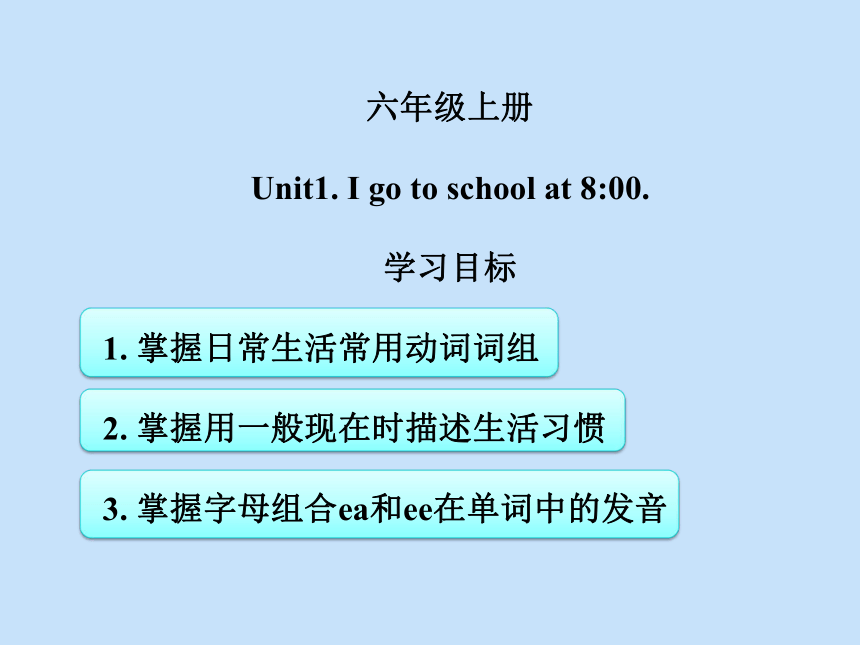 | |
| 格式 | pptx | ||
| 文件大小 | 2.0MB | ||
| 资源类型 | 试卷 | ||
| 版本资源 | 人教精通版(三年级起点) | ||
| 科目 | 英语 | ||
| 更新时间 | 2021-07-08 17:57:20 | ||
图片预览

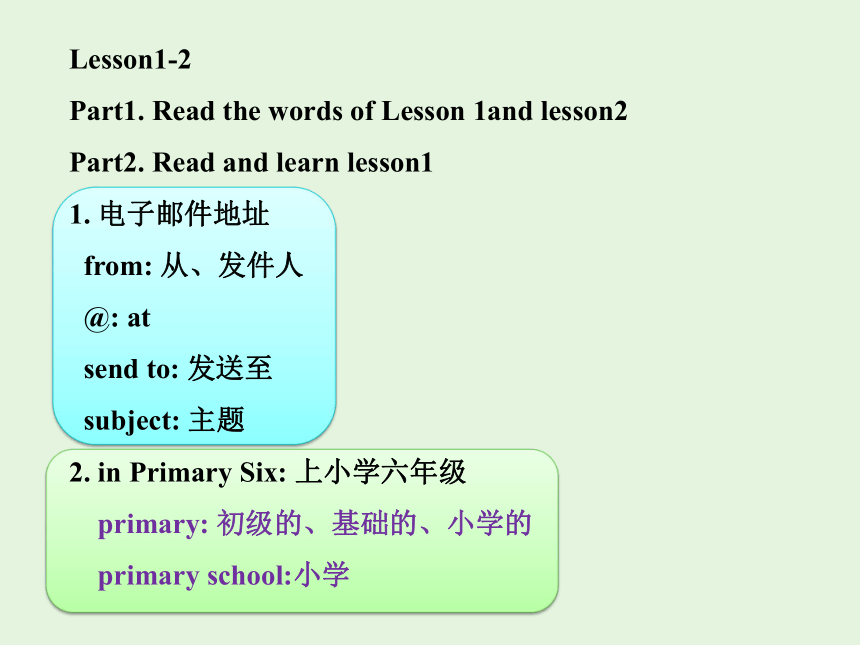
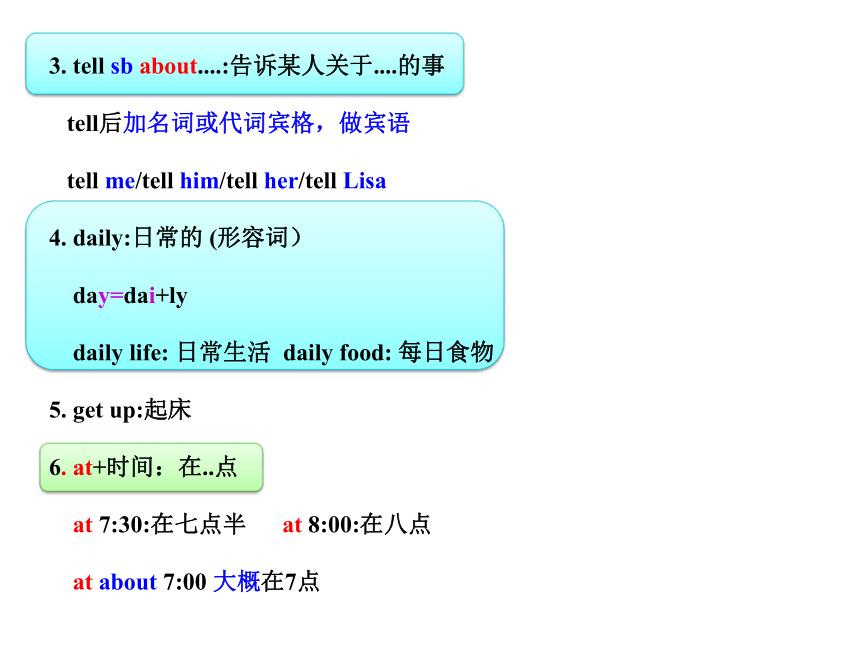
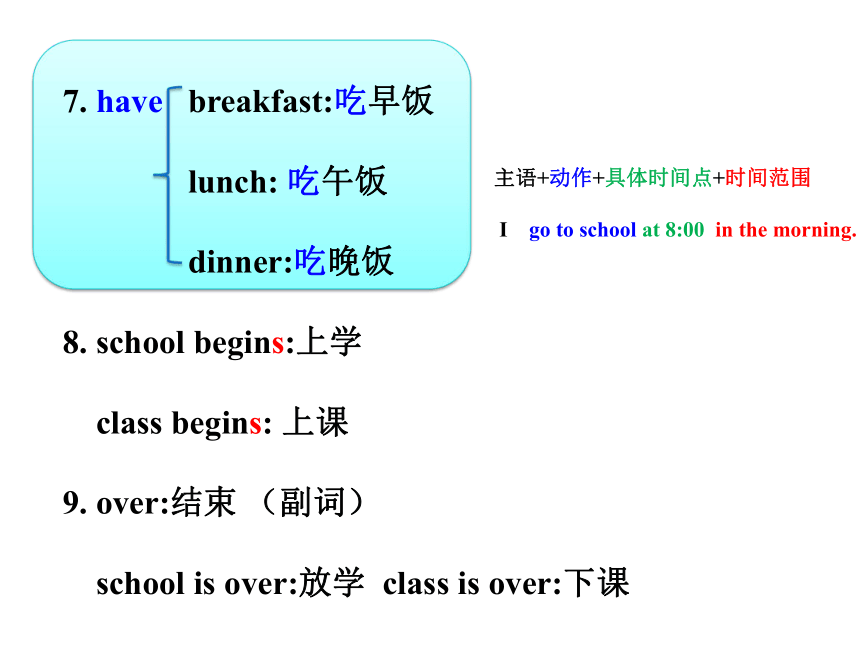
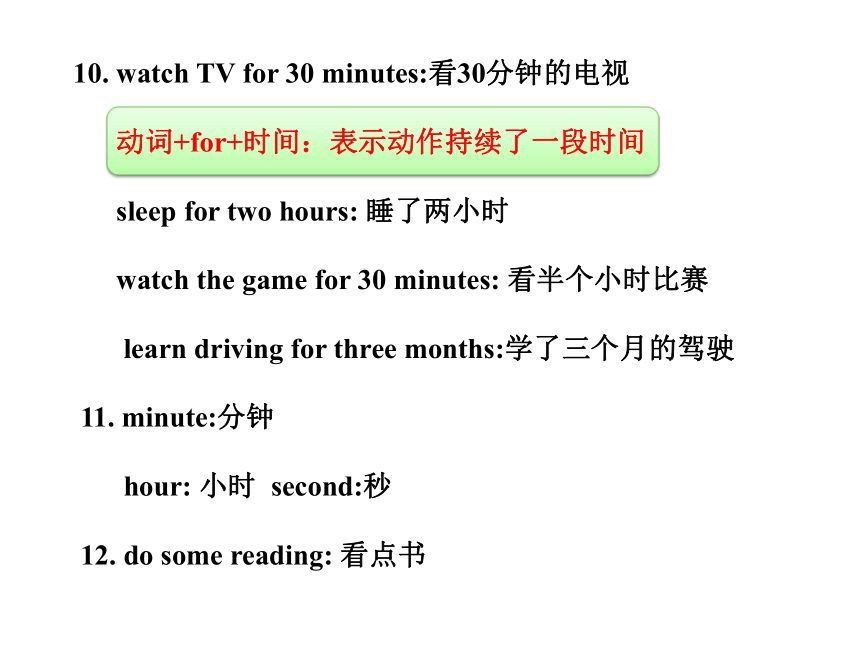
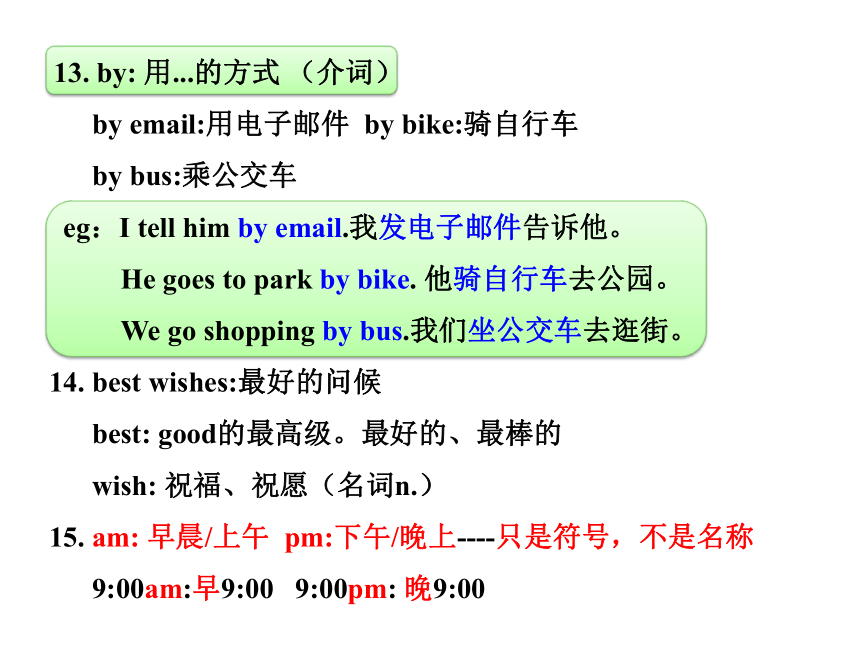
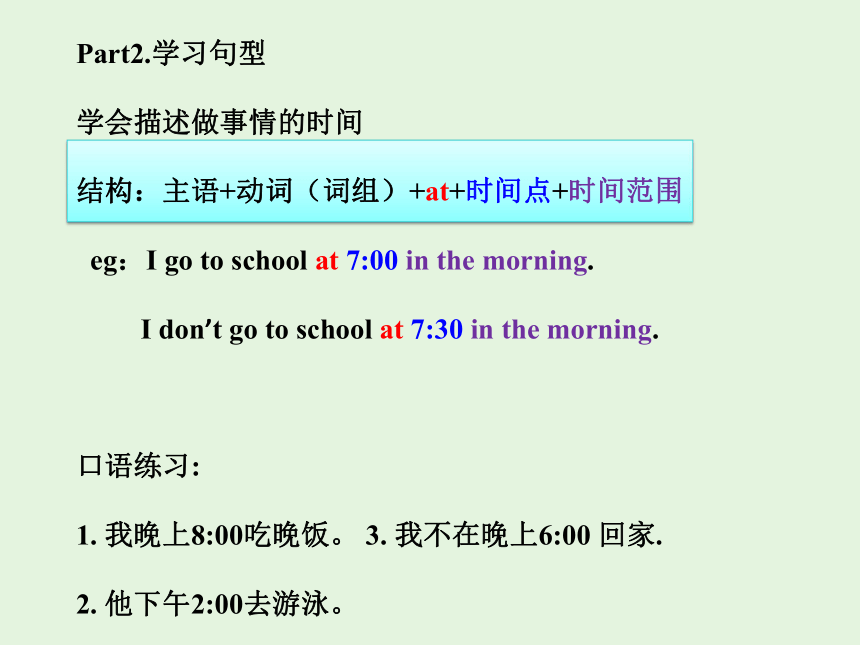
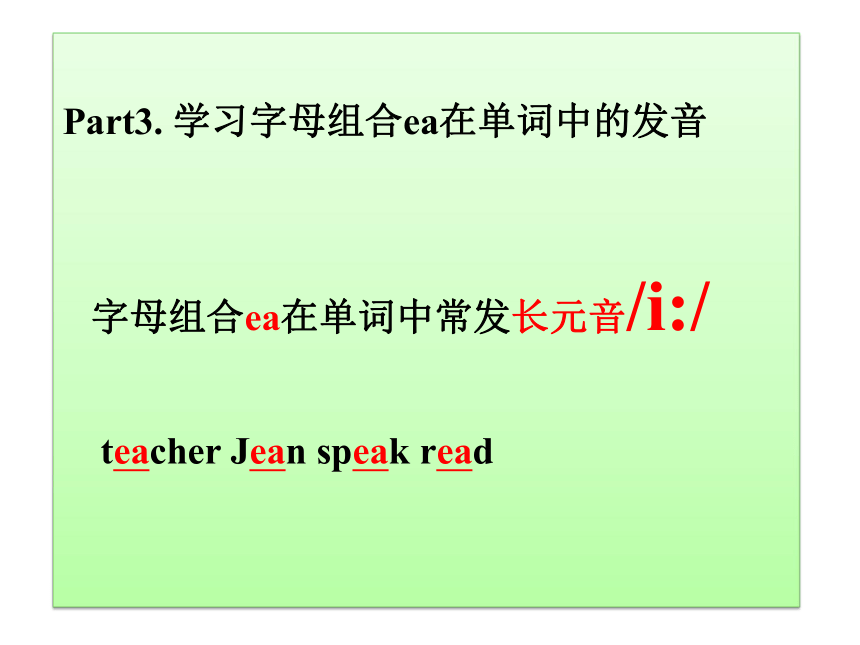

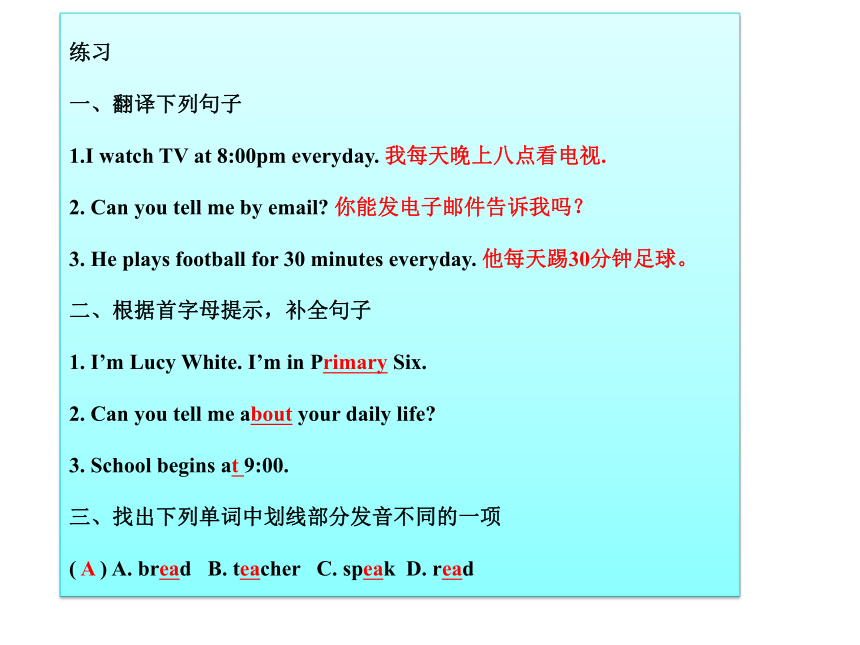
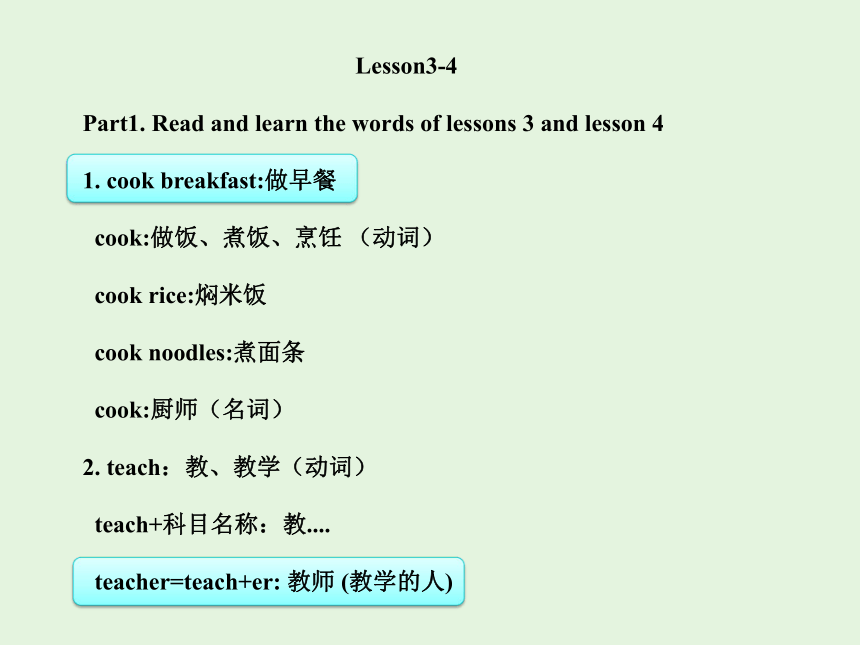
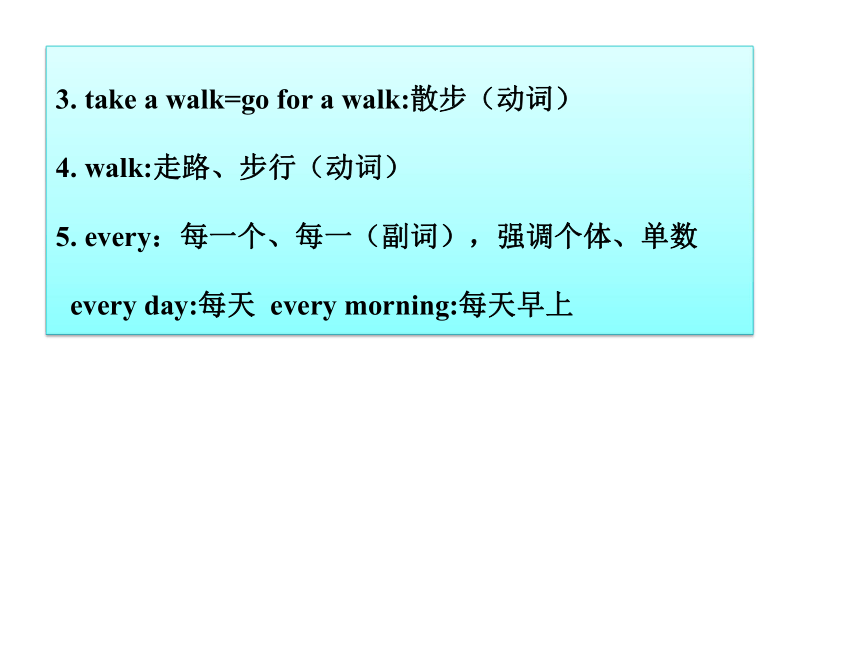
文档简介
六年级上册
Unit1. I go to school at 8:00.
学习目标
1. 掌握日常生活常用动词词组
2. 掌握用一般现在时描述生活习惯
3. 掌握字母组合ea和ee在单词中的发音
Lesson1-2
Part1. Read the words of Lesson 1and lesson2
Part2. Read and learn lesson1
1. 电子邮件地址
from: 从、发件人
@: at
send to: 发送至
subject: 主题
2. in Primary Six: 上小学六年级
primary: 初级的、基础的、小学的
primary school:小学
3. tell sb about....:告诉某人关于....的事
tell后加名词或代词宾格,做宾语
tell me/tell him/tell her/tell Lisa
4. daily:日常的 (形容词)
day=dai+ly
daily life: 日常生活 daily food: 每日食物
5. get up:起床
6. at+时间:在..点
at 7:30:在七点半 at 8:00:在八点
at about 7:00 大概在7点
7. have breakfast:吃早饭
lunch: 吃午饭
dinner:吃晚饭
8. school begins:上学
class begins: 上课
9. over:结束 (副词)
school is over:放学 class is over:下课
主语+动作+具体时间点+时间范围
I go to school at 8:00 in the morning.
10. watch TV for 30 minutes:看30分钟的电视
动词+for+时间:表示动作持续了一段时间
sleep for two hours: 睡了两小时
watch the game for 30 minutes: 看半个小时比赛
learn driving for three months:学了三个月的驾驶
11. minute:分钟
hour: 小时 second:秒
12. do some reading: 看点书
13. by: 用...的方式 (介词)
by email:用电子邮件 by bike:骑自行车
by bus:乘公交车
eg:I tell him by email.我发电子邮件告诉他。
He goes to park by bike. 他骑自行车去公园。
We go shopping by bus.我们坐公交车去逛街。
14. best wishes:最好的问候
best: good的最高级。最好的、最棒的
wish: 祝福、祝愿(名词n.)
15. am: 早晨/上午 pm:下午/晚上----只是符号,不是名称
9:00am:早9:00 9:00pm: 晚9:00
Part2.学习句型
学会描述做事情的时间
结构:主语+动词(词组)+at+时间点+时间范围
eg:I go to school at 7:00 in the morning.
I don’t go to school at 7:30 in the morning.
口语练习:
1. 我晚上8:00吃晚饭。 3. 我不在晚上6:00 回家.
2. 他下午2:00去游泳。
Part3. 学习字母组合ea在单词中的发音
字母组合ea在单词中常发长元音/i:/
teacher Jean speak read
练习
一、翻译下列句子
1.I watch TV at 8:00pm everyday.
2. Can you tell me by email?
3. He plays football for 30 minutes everyday.
二、根据首字母提示,补全句子
1. I’m Lucy White. I’m in P____ Six.
2. Can you tell me a_____ your daily life?
3. School begins a____ 9:00.
三、找出下列单词中划线部分发音不同的一项
( ) A. breakfast B. teacher C. speak D. read
练习
一、翻译下列句子
1.I watch TV at 8:00pm everyday. 我每天晚上八点看电视.
2. Can you tell me by email? 你能发电子邮件告诉我吗?
3. He plays football for 30 minutes everyday. 他每天踢30分钟足球。
二、根据首字母提示,补全句子
1. I’m Lucy White. I’m in Primary Six.
2. Can you tell me about your daily life?
3. School begins at 9:00.
三、找出下列单词中划线部分发音不同的一项
( A ) A. bread B. teacher C. speak D. read
Lesson3-4
Part1. Read and learn the words of lessons 3 and lesson 4
1. cook breakfast:做早餐
cook:做饭、煮饭、烹饪 (动词)
cook rice:焖米饭
cook noodles:煮面条
cook:厨师(名词)
2. teach:教、教学(动词)
teach+科目名称:教....
teacher=teach+er: 教师 (教学的人)
3. take a walk=go for a walk:散步(动词)
4. walk:走路、步行(动词)
5. every:每一个、每一(副词),强调个体、单数
every day:每天 every morning:每天早上
Part2. Learn lesson3 and lesson4
1.I’m very happy to get your email.
我很高兴收到你的电子邮件。
be happy to do:很高兴做某事、做某事很开心、很高兴
eg: She is happy to have lunch with you.
和你吃午饭她很开心。
We are very happy to sing together.
我们很高兴一起唱歌。
2. get up:起床 dress up:穿衣打扮 make up:化妆
3. Her students often learn English by singing, chanting and
playing games.
她的学生们经常用唱歌、朗诵和做游戏的方式学英语。
by: 以...的方式(介词),后面+动词ing
4. like .....very much: 非常喜欢....
They like her lessons very much.
他们非常喜欢她的课。
We like our school very much.
我们非常喜欢我们的学校。
He likes football very much.
他非常喜欢足球。
5. then: 然后
Part3.学习句型
学会描述他人做事情的时间
结构:单三主语+动词三单形式+at+时间+时间范围
eg:She gets up at 6:00 in the morning.
She doesn’t get up at6:30 in the morning.
时态:学习一般现在时
一般现在时用来描述事实、习惯、规律等动作
主语为第一人称、第二人称及复数人称时,动词用原形,否定句中动词部分为don’t+动词原形
主语为第三人称单数时,动词用三单形式,
否定句中动词用doesn’t+动词原形
I like music. 我喜欢音乐。(事实)
You often go to school by bus.
你经常做公交车上学。 (习惯)
We play football every afternoon.
我们每天下午踢足球。(习惯)
They don’t like PE. 他们不喜欢体育课。 (否定事实)
He goes to school on foot.
他走路去上学。(习惯)
Peter doesn’t like music. 彼得不喜欢音乐。(否定事实)
Part4. 学习字母组合ea在单词中的发音
字母组合ea在单词用常发单元音/e/
bread breakfast instead
Lesson5-6
Part1. Read the words left in unit 1.
Part2. Learn the language points.
1. What do you do on Saturdays?
每周六你都做什么?
What:是询问内容和具体事情的疑问词
do:助动词,针对实意动词进行提问时必须用,无意思。
you:你。第二人称代词。主格
do:做/干。实意动词原形
Saturdays: 周六(复数)询问动作的习惯或规律,所以用复数。
What do you do on+日期复数?
每周...你都干什么?
2. 表示时间频率的副词
often:时常;常常
usually:经常;一般
always: 总是
sometimes: 有时候
动词多用原形
当主语为第三人称单数,动词用三单形式
都用在一般现在时中
He often goes and sees a film.
My father usually has piano lessons.
Peter always cleans the window on Saturdays.
Lisa sometimes helps her mother to do housework.
3. be difficult to do sth:很难做某事,做某事是很难的
eg:Is it difficult to play the piano?
弹钢琴很难吗?
difficult:困难的
反义词:easy:容易的、简单的
be easy to do sth: 很容易做某事,做某事很容易的
4. pracitse: 练习(动词)
practise.....:练习...
practise the piano:练习钢琴
practise football:练习足球
5. help sb to do..:帮助某人做某事
help her to clean the floor:帮她扫地
help old people to cross the road:帮助老年人过马路
6. learn from....:向...学习
learn from her:向她学习
learn from the story:从故事中学习
Part3. 句型:学习询问他人平时爱干什么的表达
提问:What do you do on+星期名称复数?
does+第三人单数+do+星期名称复数?
回答: 主语+often/usually/always+动词/动词词组.
eg:-What do you do on Mondays?
-:I often have art lessons.
每周一你都干什么?我一般会上美术课。
-:What do they do on Fridays?
-:They usually see a film.
周五他们一般都干什么?他们经常去看场电影。
-:What does she do on Sundays?
-:She often goes swimming.
-:她周日一般都干什么?她经常去游泳。
-:What does Peter do on Saturdays?
-:He always cleans the window.
彼得周六一般都干什么?他总是擦玻璃。
Part4. 掌握字母组合ee在单词中的的发音
字母组合ee在单词中发长元音/i:/
bee sheep jeep sleep
练习:
一、根据汉语写出下列单词或词组
1. 早餐 2. 午餐 3. 擦门 4. 时常;常常 5. 困难
二、用所给单词的正确形式填空
1. What do you often do on_____ (Saturday)?
2. What ____ (does) Kate do every night?
3. He often goes and ____ (see) a film.
三、连词成句
1. lessons,have, I , piano (.)
2. is, the , play, piano, it, difficult, to(?)
3. helps, sometimes, her, to, mother, she, the , housework, do (.)
练习:
一、根据汉语写出下列单词或词组
1.早餐 2. 午餐 3. 擦门 4. 时常;常常 5. 困难
1.breakfast 2. lunch 3.clean the 4. often 5. difficult
二、用所给单词的正确形式填空
1. What do you often do on Saturdays (Saturday)?
2. What does (do) Kate do every night?
3. He often goes and sees (see) a film.
三、连词成句
1. lessons,have, I , piano (.)
I have piano lessons.
2. is, the , play, piano, it, difficult, to(?)
Is it difficult to play the piano?
3. helps, sometimes, her, to, mother, she, the , housework, do (.)
Sometimes she helps her mother to do the housework.
Revision and fun facts
Part1. Read the text.朗读故事
Part2. 学习知识点并复习所学知识
1. I’m Dancing Cat. 我是跳舞的小猫。
dancing:会跳舞的、能跳舞的
部分动词的ing形式可与做形容词,意思为具备某种能力、会做某事的。
talking doll: 会说话的娃娃 dancing cat:会跳舞的猫
2. 巩固一般现在时
一般现在时用来描述规律性的、习惯性的动作、状态以及事实。当主语是第三人称单数时,动词要用三单形式,否定句中用助动词doesn’t+动词原形。
eg:I often clean the window on Sundays.
She often cleans the window on Sundays.
Peter often cleans the window on Sundays.
Your father often cleans the window on Sundays.
I don’t clean the floor on Sundays.
She doesn’t clean the window on Sundays.
Peter doesn’t clean the window on Sundays.
Your father doesn’t clean the window on Sundays.
一般现在时的标志词
often\usually\always\sometimes\everyday\every night\every...
3. 叙述时间时用介词at+时间点
at7:30 at11:45
4. Is it difficult to+动词原形?
...很难吗?
5. Practice makes perfect. 熟能生巧。
6. 叙述某人何时做某事的陈述句
肯定句:主语+动词+at时间+时间范围。
否定句:主语+don’t/doesn’t+动词原形+ at时间+时间范围。
eg: I have breakfast at 7:30 in the morning.
She gets up at 6:00 in the morning.
I don’t have breakfast at 7:00 in the morning.
She doesn’t get up at 6:30 in the morning.
7. 询问他人平时做何事的表达
What do/does+主语+do+时间范围?
主语+often/usually/always/sometimes+动词+时间范围.
eg -:What do you do on Saturdays?每周六你都干什么?
-:I often go and see a film. 我经常去看电影。
-:What does Kate do on Saturdays? 凯特每周六都干什么?
-:She usually plays the piano. 她一般都会弹钢琴。
Part3. 掌握字母组合ea和ee在单词中的发音
1. 字母组合ea在单词中发单元音/e/
bread breakfast instead
2. 字母组合ea在单词中发长元音/i:/
meat sea teacher read
3. 字母组合ee在单词中发长元音/i:/
see sheep jeep sheep sleep
练习
一、找出下列单词中划线部分发音不同的一项
( )1. A. sea B. tea C. meat D. bread
( ) 2. A. breakfast B. instead C. bread D. seat
二、用所给单词的正确形式填空
1. She ____(get)up at 6:00 in the morning.
2. She ___ (don’t) ____ (get)up at 6:30 in the morning.
3. I’m very happy ____ (get)your Email.
4. After dinner she often___ (take) a walk with my father.
5. Best ____ (wish)!
三、选择正确的答案填空
1. After dinner I watch TV __ 30 minutes.
A. about B. at C. for D. to
2. I go home ____ 4:00 in the afternoon.
A. in B. on C. for D. at
3. Can you tell me ___ email?
A. for B. to C. from D. by
4. Please tell me ____ your parents.
A. of B. about C. for D. to
5. Is it difficult ____ the piano?
A. plays B. play C. to play D. playing
练习
一、找出下列单词中划线部分发音不同的一项
(D )1. A. sea B. tea C. meat D. bread
(D ) 2. A. breakfast B. instead C. bread D. seat
二、用所给单词的正确形式填空
1. She gets(get)up at 6:00 in the morning.
2. She doesn’t (don’t) get (get)up at 6:30 in the morning.
3. I’m very happy to get(get)your Email.
4. After dinner she often takes (take) a walk with my father.
5. Best wishes (wish)!
三、选择正确的答案填空
1. After dinner I watch TV __ 30 minutes.
A. about B. at C. for D. to
2. I go home ____ 4:00 in the afternoon.
A. in B. on C. for D. at
3. Can you tell me ___ email?
A. for B. to C. from D. by
4. Please tell me ____ your parents.
A. of B. about C. for D. to
5. Is it difficult ____ the piano?
A. plays B. play C. to play D. playing
Unit 2 What’s your hobby?
学习目标
1. 学习谈论他人的兴趣爱好
2. 掌握一些动词和词组的含义及用法
3. 掌握字母组合oo和oa在单词中的发音
Lesson 7-8
Part1. Read the words in L7-8 on page 86.
朗读86页中第7-8课的单词
Part2. Read and learn lesson 7.朗读并学习第七课
1. have a look:看一看
Can I have a look please?我能看一看吗?
2. open:打开 close:关上
turn on:打开(电源电器) turn off:关上(电源电器)
3. 巩固询问他人是否喜欢某物的句型
Do you like+复数名词?
Yes,I do./No, I don’t.
eg: Do you like toys? Yes,I do.
Do you like books? No,I don’t.
4. I like collecting them.
like+动词ing:喜欢做某事
like swimming:喜欢游泳 like collecting:喜欢收集
like cleaning:喜欢打扫 like fishing:喜欢钓鱼
5. collect:收集
6. My hobby is collecting stamps.
我的爱好是集邮。
动词的ing形式在该句话中作名词,“collecting
stamps”指集邮这件事,而不是动作。
7. colourful=colour+ful:五颜六色的
beauty=beauti+ful:美丽的
Part3. 学习谈论他人爱好的句型
提问:What’s your hobby?
你的爱好是什么?
(学过的相似句型结构:What’s your name?)
回答:My hobby is+名词/动词ing.
我的爱好是...。
(学过的相似句型结构:My name is....)
eg: -What’s your hobby?
-My hobby is collecting stamps.
你的爱好是什么?我的爱好是集邮。
-What’s your hobby?
-My hobby is drama.
你的爱好是什么?我的爱好是戏剧。
Part4. Oral practice:口语练习
1. 你的爱好是什么?
我的爱好是收集玩具汽车。
2. 你的爱好是什么?
我的爱好是逛街。
3. 你的爱好是什么?
我的爱好是音乐。
Part5. Lean the pronunciation of “oo”
学习字母组合oo在单词中的发音
字母组合oo多数情况前发长元音/u:/
pool, school, cool, room
https://www.21cnjy.com/help/help_extract.php
Unit1. I go to school at 8:00.
学习目标
1. 掌握日常生活常用动词词组
2. 掌握用一般现在时描述生活习惯
3. 掌握字母组合ea和ee在单词中的发音
Lesson1-2
Part1. Read the words of Lesson 1and lesson2
Part2. Read and learn lesson1
1. 电子邮件地址
from: 从、发件人
@: at
send to: 发送至
subject: 主题
2. in Primary Six: 上小学六年级
primary: 初级的、基础的、小学的
primary school:小学
3. tell sb about....:告诉某人关于....的事
tell后加名词或代词宾格,做宾语
tell me/tell him/tell her/tell Lisa
4. daily:日常的 (形容词)
day=dai+ly
daily life: 日常生活 daily food: 每日食物
5. get up:起床
6. at+时间:在..点
at 7:30:在七点半 at 8:00:在八点
at about 7:00 大概在7点
7. have breakfast:吃早饭
lunch: 吃午饭
dinner:吃晚饭
8. school begins:上学
class begins: 上课
9. over:结束 (副词)
school is over:放学 class is over:下课
主语+动作+具体时间点+时间范围
I go to school at 8:00 in the morning.
10. watch TV for 30 minutes:看30分钟的电视
动词+for+时间:表示动作持续了一段时间
sleep for two hours: 睡了两小时
watch the game for 30 minutes: 看半个小时比赛
learn driving for three months:学了三个月的驾驶
11. minute:分钟
hour: 小时 second:秒
12. do some reading: 看点书
13. by: 用...的方式 (介词)
by email:用电子邮件 by bike:骑自行车
by bus:乘公交车
eg:I tell him by email.我发电子邮件告诉他。
He goes to park by bike. 他骑自行车去公园。
We go shopping by bus.我们坐公交车去逛街。
14. best wishes:最好的问候
best: good的最高级。最好的、最棒的
wish: 祝福、祝愿(名词n.)
15. am: 早晨/上午 pm:下午/晚上----只是符号,不是名称
9:00am:早9:00 9:00pm: 晚9:00
Part2.学习句型
学会描述做事情的时间
结构:主语+动词(词组)+at+时间点+时间范围
eg:I go to school at 7:00 in the morning.
I don’t go to school at 7:30 in the morning.
口语练习:
1. 我晚上8:00吃晚饭。 3. 我不在晚上6:00 回家.
2. 他下午2:00去游泳。
Part3. 学习字母组合ea在单词中的发音
字母组合ea在单词中常发长元音/i:/
teacher Jean speak read
练习
一、翻译下列句子
1.I watch TV at 8:00pm everyday.
2. Can you tell me by email?
3. He plays football for 30 minutes everyday.
二、根据首字母提示,补全句子
1. I’m Lucy White. I’m in P____ Six.
2. Can you tell me a_____ your daily life?
3. School begins a____ 9:00.
三、找出下列单词中划线部分发音不同的一项
( ) A. breakfast B. teacher C. speak D. read
练习
一、翻译下列句子
1.I watch TV at 8:00pm everyday. 我每天晚上八点看电视.
2. Can you tell me by email? 你能发电子邮件告诉我吗?
3. He plays football for 30 minutes everyday. 他每天踢30分钟足球。
二、根据首字母提示,补全句子
1. I’m Lucy White. I’m in Primary Six.
2. Can you tell me about your daily life?
3. School begins at 9:00.
三、找出下列单词中划线部分发音不同的一项
( A ) A. bread B. teacher C. speak D. read
Lesson3-4
Part1. Read and learn the words of lessons 3 and lesson 4
1. cook breakfast:做早餐
cook:做饭、煮饭、烹饪 (动词)
cook rice:焖米饭
cook noodles:煮面条
cook:厨师(名词)
2. teach:教、教学(动词)
teach+科目名称:教....
teacher=teach+er: 教师 (教学的人)
3. take a walk=go for a walk:散步(动词)
4. walk:走路、步行(动词)
5. every:每一个、每一(副词),强调个体、单数
every day:每天 every morning:每天早上
Part2. Learn lesson3 and lesson4
1.I’m very happy to get your email.
我很高兴收到你的电子邮件。
be happy to do:很高兴做某事、做某事很开心、很高兴
eg: She is happy to have lunch with you.
和你吃午饭她很开心。
We are very happy to sing together.
我们很高兴一起唱歌。
2. get up:起床 dress up:穿衣打扮 make up:化妆
3. Her students often learn English by singing, chanting and
playing games.
她的学生们经常用唱歌、朗诵和做游戏的方式学英语。
by: 以...的方式(介词),后面+动词ing
4. like .....very much: 非常喜欢....
They like her lessons very much.
他们非常喜欢她的课。
We like our school very much.
我们非常喜欢我们的学校。
He likes football very much.
他非常喜欢足球。
5. then: 然后
Part3.学习句型
学会描述他人做事情的时间
结构:单三主语+动词三单形式+at+时间+时间范围
eg:She gets up at 6:00 in the morning.
She doesn’t get up at6:30 in the morning.
时态:学习一般现在时
一般现在时用来描述事实、习惯、规律等动作
主语为第一人称、第二人称及复数人称时,动词用原形,否定句中动词部分为don’t+动词原形
主语为第三人称单数时,动词用三单形式,
否定句中动词用doesn’t+动词原形
I like music. 我喜欢音乐。(事实)
You often go to school by bus.
你经常做公交车上学。 (习惯)
We play football every afternoon.
我们每天下午踢足球。(习惯)
They don’t like PE. 他们不喜欢体育课。 (否定事实)
He goes to school on foot.
他走路去上学。(习惯)
Peter doesn’t like music. 彼得不喜欢音乐。(否定事实)
Part4. 学习字母组合ea在单词中的发音
字母组合ea在单词用常发单元音/e/
bread breakfast instead
Lesson5-6
Part1. Read the words left in unit 1.
Part2. Learn the language points.
1. What do you do on Saturdays?
每周六你都做什么?
What:是询问内容和具体事情的疑问词
do:助动词,针对实意动词进行提问时必须用,无意思。
you:你。第二人称代词。主格
do:做/干。实意动词原形
Saturdays: 周六(复数)询问动作的习惯或规律,所以用复数。
What do you do on+日期复数?
每周...你都干什么?
2. 表示时间频率的副词
often:时常;常常
usually:经常;一般
always: 总是
sometimes: 有时候
动词多用原形
当主语为第三人称单数,动词用三单形式
都用在一般现在时中
He often goes and sees a film.
My father usually has piano lessons.
Peter always cleans the window on Saturdays.
Lisa sometimes helps her mother to do housework.
3. be difficult to do sth:很难做某事,做某事是很难的
eg:Is it difficult to play the piano?
弹钢琴很难吗?
difficult:困难的
反义词:easy:容易的、简单的
be easy to do sth: 很容易做某事,做某事很容易的
4. pracitse: 练习(动词)
practise.....:练习...
practise the piano:练习钢琴
practise football:练习足球
5. help sb to do..:帮助某人做某事
help her to clean the floor:帮她扫地
help old people to cross the road:帮助老年人过马路
6. learn from....:向...学习
learn from her:向她学习
learn from the story:从故事中学习
Part3. 句型:学习询问他人平时爱干什么的表达
提问:What do you do on+星期名称复数?
does+第三人单数+do+星期名称复数?
回答: 主语+often/usually/always+动词/动词词组.
eg:-What do you do on Mondays?
-:I often have art lessons.
每周一你都干什么?我一般会上美术课。
-:What do they do on Fridays?
-:They usually see a film.
周五他们一般都干什么?他们经常去看场电影。
-:What does she do on Sundays?
-:She often goes swimming.
-:她周日一般都干什么?她经常去游泳。
-:What does Peter do on Saturdays?
-:He always cleans the window.
彼得周六一般都干什么?他总是擦玻璃。
Part4. 掌握字母组合ee在单词中的的发音
字母组合ee在单词中发长元音/i:/
bee sheep jeep sleep
练习:
一、根据汉语写出下列单词或词组
1. 早餐 2. 午餐 3. 擦门 4. 时常;常常 5. 困难
二、用所给单词的正确形式填空
1. What do you often do on_____ (Saturday)?
2. What ____ (does) Kate do every night?
3. He often goes and ____ (see) a film.
三、连词成句
1. lessons,have, I , piano (.)
2. is, the , play, piano, it, difficult, to(?)
3. helps, sometimes, her, to, mother, she, the , housework, do (.)
练习:
一、根据汉语写出下列单词或词组
1.早餐 2. 午餐 3. 擦门 4. 时常;常常 5. 困难
1.breakfast 2. lunch 3.clean the 4. often 5. difficult
二、用所给单词的正确形式填空
1. What do you often do on Saturdays (Saturday)?
2. What does (do) Kate do every night?
3. He often goes and sees (see) a film.
三、连词成句
1. lessons,have, I , piano (.)
I have piano lessons.
2. is, the , play, piano, it, difficult, to(?)
Is it difficult to play the piano?
3. helps, sometimes, her, to, mother, she, the , housework, do (.)
Sometimes she helps her mother to do the housework.
Revision and fun facts
Part1. Read the text.朗读故事
Part2. 学习知识点并复习所学知识
1. I’m Dancing Cat. 我是跳舞的小猫。
dancing:会跳舞的、能跳舞的
部分动词的ing形式可与做形容词,意思为具备某种能力、会做某事的。
talking doll: 会说话的娃娃 dancing cat:会跳舞的猫
2. 巩固一般现在时
一般现在时用来描述规律性的、习惯性的动作、状态以及事实。当主语是第三人称单数时,动词要用三单形式,否定句中用助动词doesn’t+动词原形。
eg:I often clean the window on Sundays.
She often cleans the window on Sundays.
Peter often cleans the window on Sundays.
Your father often cleans the window on Sundays.
I don’t clean the floor on Sundays.
She doesn’t clean the window on Sundays.
Peter doesn’t clean the window on Sundays.
Your father doesn’t clean the window on Sundays.
一般现在时的标志词
often\usually\always\sometimes\everyday\every night\every...
3. 叙述时间时用介词at+时间点
at7:30 at11:45
4. Is it difficult to+动词原形?
...很难吗?
5. Practice makes perfect. 熟能生巧。
6. 叙述某人何时做某事的陈述句
肯定句:主语+动词+at时间+时间范围。
否定句:主语+don’t/doesn’t+动词原形+ at时间+时间范围。
eg: I have breakfast at 7:30 in the morning.
She gets up at 6:00 in the morning.
I don’t have breakfast at 7:00 in the morning.
She doesn’t get up at 6:30 in the morning.
7. 询问他人平时做何事的表达
What do/does+主语+do+时间范围?
主语+often/usually/always/sometimes+动词+时间范围.
eg -:What do you do on Saturdays?每周六你都干什么?
-:I often go and see a film. 我经常去看电影。
-:What does Kate do on Saturdays? 凯特每周六都干什么?
-:She usually plays the piano. 她一般都会弹钢琴。
Part3. 掌握字母组合ea和ee在单词中的发音
1. 字母组合ea在单词中发单元音/e/
bread breakfast instead
2. 字母组合ea在单词中发长元音/i:/
meat sea teacher read
3. 字母组合ee在单词中发长元音/i:/
see sheep jeep sheep sleep
练习
一、找出下列单词中划线部分发音不同的一项
( )1. A. sea B. tea C. meat D. bread
( ) 2. A. breakfast B. instead C. bread D. seat
二、用所给单词的正确形式填空
1. She ____(get)up at 6:00 in the morning.
2. She ___ (don’t) ____ (get)up at 6:30 in the morning.
3. I’m very happy ____ (get)your Email.
4. After dinner she often___ (take) a walk with my father.
5. Best ____ (wish)!
三、选择正确的答案填空
1. After dinner I watch TV __ 30 minutes.
A. about B. at C. for D. to
2. I go home ____ 4:00 in the afternoon.
A. in B. on C. for D. at
3. Can you tell me ___ email?
A. for B. to C. from D. by
4. Please tell me ____ your parents.
A. of B. about C. for D. to
5. Is it difficult ____ the piano?
A. plays B. play C. to play D. playing
练习
一、找出下列单词中划线部分发音不同的一项
(D )1. A. sea B. tea C. meat D. bread
(D ) 2. A. breakfast B. instead C. bread D. seat
二、用所给单词的正确形式填空
1. She gets(get)up at 6:00 in the morning.
2. She doesn’t (don’t) get (get)up at 6:30 in the morning.
3. I’m very happy to get(get)your Email.
4. After dinner she often takes (take) a walk with my father.
5. Best wishes (wish)!
三、选择正确的答案填空
1. After dinner I watch TV __ 30 minutes.
A. about B. at C. for D. to
2. I go home ____ 4:00 in the afternoon.
A. in B. on C. for D. at
3. Can you tell me ___ email?
A. for B. to C. from D. by
4. Please tell me ____ your parents.
A. of B. about C. for D. to
5. Is it difficult ____ the piano?
A. plays B. play C. to play D. playing
Unit 2 What’s your hobby?
学习目标
1. 学习谈论他人的兴趣爱好
2. 掌握一些动词和词组的含义及用法
3. 掌握字母组合oo和oa在单词中的发音
Lesson 7-8
Part1. Read the words in L7-8 on page 86.
朗读86页中第7-8课的单词
Part2. Read and learn lesson 7.朗读并学习第七课
1. have a look:看一看
Can I have a look please?我能看一看吗?
2. open:打开 close:关上
turn on:打开(电源电器) turn off:关上(电源电器)
3. 巩固询问他人是否喜欢某物的句型
Do you like+复数名词?
Yes,I do./No, I don’t.
eg: Do you like toys? Yes,I do.
Do you like books? No,I don’t.
4. I like collecting them.
like+动词ing:喜欢做某事
like swimming:喜欢游泳 like collecting:喜欢收集
like cleaning:喜欢打扫 like fishing:喜欢钓鱼
5. collect:收集
6. My hobby is collecting stamps.
我的爱好是集邮。
动词的ing形式在该句话中作名词,“collecting
stamps”指集邮这件事,而不是动作。
7. colourful=colour+ful:五颜六色的
beauty=beauti+ful:美丽的
Part3. 学习谈论他人爱好的句型
提问:What’s your hobby?
你的爱好是什么?
(学过的相似句型结构:What’s your name?)
回答:My hobby is+名词/动词ing.
我的爱好是...。
(学过的相似句型结构:My name is....)
eg: -What’s your hobby?
-My hobby is collecting stamps.
你的爱好是什么?我的爱好是集邮。
-What’s your hobby?
-My hobby is drama.
你的爱好是什么?我的爱好是戏剧。
Part4. Oral practice:口语练习
1. 你的爱好是什么?
我的爱好是收集玩具汽车。
2. 你的爱好是什么?
我的爱好是逛街。
3. 你的爱好是什么?
我的爱好是音乐。
Part5. Lean the pronunciation of “oo”
学习字母组合oo在单词中的发音
字母组合oo多数情况前发长元音/u:/
pool, school, cool, room
https://www.21cnjy.com/help/help_extract.php
同课章节目录
- Unit 1 I go to school at 8:00.
- Lesson 1
- Lesson 2
- Lesson 3
- Lesson 4
- Lesson 5
- Lesson 6
- Unit 2 What's your hobby?
- Lesson 7
- Lesson 8
- Lesson 9
- Lesson 10
- Lesson 11
- Lesson 12
- Unit 3 Would you like to come to my birthday party
- Lesson 13
- Lesson 14
- Lesson 15
- Lesson 16
- Lesson 17
- Lesson 18
- Fun Time 1
- Recycle 1
- Recycle 2
- Fun Reading
- Unit 4 January is the first month.
- Lesson 19
- Lesson 20
- Lesson 21
- Lesson 22
- Lesson 23
- Lesson 24
- Unit 5 July is the seventh month.
- Lesson 25
- Lesson 26
- Lesson 27
- Lesson 28
- Lesson 29
- Lesson 30
- Unit 6 There are four seasons in a year.
- Lesson 31
- Lesson 32
- Lesson 33
- Lesson 34
- Lesson 35
- Lesson 36
- Fun Time 2
- Recycle 1
- Recycle 2
- Fun Reading
